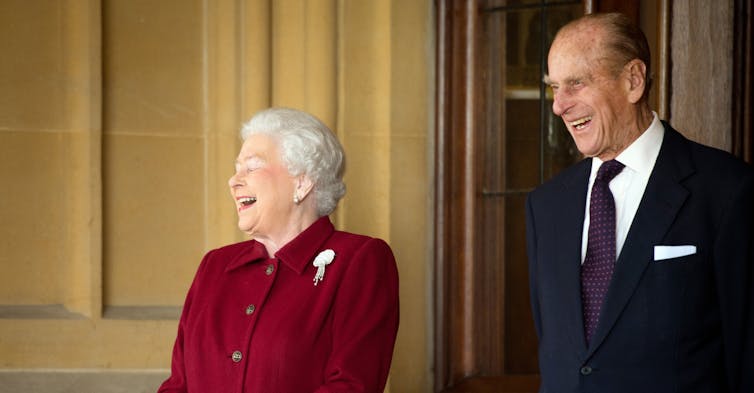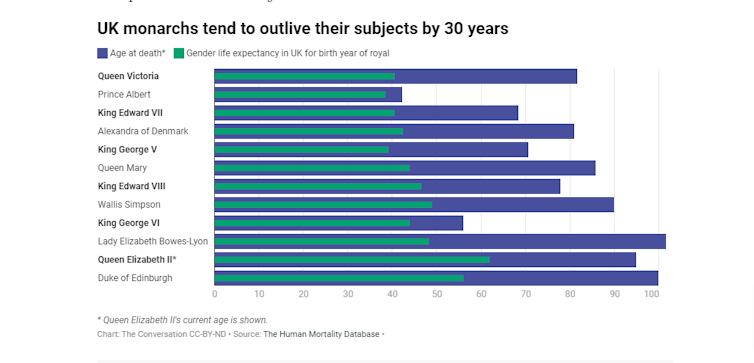British royals outlive their subjects by three full decades, writes S. Jay Olshansky.

(Leon Neal-WPA Pool/Getty Images)
By S. Jay Olshansky
University of Illinois at Chicago
 In the U.K. it is customary to receive a personalized message from the queen on your 100th birthday – such is the relative rarity of reaching the milestone.
In the U.K. it is customary to receive a personalized message from the queen on your 100th birthday – such is the relative rarity of reaching the milestone.
Prince Philip was just a couple months off, dying at the age of 99 years and 10 months on April 9. The last notable royal death before his was that of the queen mother in 2002. She was 101 years old.
Reaching such a ripe old age isn’t uncommon among the British ruling family – in fact, my analysis shows that on average they live an additional 30 years compared with their subjects.

I looked at the duration of life of the last six British monarchs, along with the longevity of their spouses and children – in total 27 royals. What it reveals is a fascinating and familiar story for those of us who study aging and longevity for a living. As a professor of epidemiology and biostatistics, I had previously observed the exact same phenomenon among U.S. presidents – they also tend to live decades longer than the general population they serve.
Age-Old Story
The ruling U.K. monarchs from Queen Victoria onward lived an average of 75 years. And this longevity will continue to rise with each day that Queen Elizabeth II – currently age 95 – lives. Their spouses survived even longer, reaching an average age of 83.5 years. If Victoria’s husband Prince Albert, who died of suspected typhoid fever at age 42 in 1861, is removed from the equation, the average duration of the life of the spouses of the monarchs was an astonishing 91.7 years.
By contrast, the average life duration of the wider U.K. population for the years the monarchs were born throughout this period was only 46 years, according to figures from the Human Mortality Database. For example, the typical life expectancy at birth for a female in the U.K. in 1819 was just under 41 years. Queen Victoria, also born in 1819, was 81 when she died. By the time Elizabeth II was born in 1926, life expectancy at birth for females in the U.K. had risen to 62 – the queen has already surpassed that by some 33 years.
Such differences in lifespan – with some members of the royal family living to an age double that expected of the general population – are considered in aging circles to be extremely large, but not uncommon.
Lifespan differences of this magnitude are the result of a combination of genetic as well as social and behavioral influences.
No one can live long without first having won the genetic lottery at birth. To maximize the chances of achieving exceptional longevity – upward of 85 years old – you must begin by being lucky enough to have long-lived parents. But even for those blessed with the gift at birth of the potential for a long life, this is no guarantee you’ll outlive your contemporaries.
The next challenge is to avoid behaviors that shorten life. That list is long – it is a lot easier to shorten life than extend it – but among the most well known are smoking, eating in excess and lack of exercise.
And then there is the influence of poverty and privilege. Being born into or living in poverty has been shown to be one of the most important factors that shortens lifespan – and it is here that perhaps the royals have the greatest advantage.
Further evidence of privilege being a crucial ingredient in the recipe for exceptional longevity can be seen in the fact that the children of the last six U.K. monarchs that died from natural causes lived an average of 69.7 years. This is some 23 years more than the average age of British subjects over that period.
Privileged Existence
Put simply, British monarchs and their families live so much longer than their subjects for the same reason other subgroups of the population across the globe live longer than contemporaries born in the same year: privilege over poverty. A famous study conducted in Manchester, England, in 2017 demonstrated vast differences in life expectancy depending on the conditions of where people lived. Access to higher education and economic status was directly correlated with longer life, while lower education, income and poverty were linked to shorter lives.
In the U.S., similar studies of life expectancy by county, census tract and zip code demonstrated the same phenomenon. In fact, there are multiple instances of dramatic differences in longevity among people living as close as across the street from each other – caused by differences in poverty and privilege.
Differences in duration of life are first defined by genetics, but it is then heavily mediated by education, income, health care, clean water, food, indoor living and working environments, and the overall effects of high or low socioeconomic status.
The long life of Prince Philip is a cause for celebrating the progress of medical science in being able to keep people alive for longer. But it is in part the result of a privilege denied to many and a reminder that humanity has a long way to go to equalize the chances of living a long life.
S. Jay Olshansky is professor of epidemiology and biostatistics at theUniversity of Illinois at Chicago.
This article is republished from The Conversation under a Creative Commons license. Read the original article.
The views expressed are solely those of the author and may or may not reflect those of Consortium News.



“The crown is mine and, i’faith, I’ll kill anyone who tries to take it away.”
— Terry Pratchett
I’m not expert with statistics but I’m not sure the author is, either. It seems that he’s making the common error of confusing the figures for average life expectancies with average ages at death. The biggest reason for the former being very low in the past – and in the present, in parts of the world cursed with poverty – is high rates of infant mortality. Royal babies, obviously, had the best care available and still do. Once a child reaches the age of 5 or 6, they have passed the most lethal stage of their life. I suspect that, if we compare average ages at death, the differences will not be so great, although they will be substantial.
I think that a key reason why British royals and U.S presidents tend to live significantly longer than average – in addition to genetic factors and good medical treatment – is that they’re respected, there is demand for their inputs and services, and life for them is worthwhile and fulfilling.
Compare this to the average “old people” in our society, who very often are forced to stop working – while still productive – because of mandatory age limits, suffer other “agist” discrimination and prejudices taking away their self-worth, and are often relegated to dismal old-age and nursing homes, where they have nothing to do other than “waiting for Godot”. Joie de vivre and will to live play a major factor in how long one lives. This is also one reason why oppressed minorities tend also to die younger.
They have the very best of professional people dedicated to keeping certain people alive for the maximum amount of time, they have access to drugs\ natural or otherwise] that work in tandem with this goal, and along with the best healthy foods and exercise all directed \monitored by the top professionals in their field to achieve the ultimate goal of longevity……. Oh! and never ever having to pay a bill in your life knowing someone else will take care of all those types of “common” problems is also a “big help”……. one says with tongue firmly planted in one”s cheek!
I think that having the best of food, organic of course, the best of medical care, never going to work, never worrying about paying the bills because you ancestors stole billions in land and cash from the British people probably helps.
If the average British serf accepted this reality they would probably still accept the monarchy. Such is the power of propaganda, which works well in the USA too.
Quite…Totally true…the members of the ruling elites – aristos, royalty, in the US not only the Prez but Congressionals and the ultra Mammon worshipers – ALL live (unless they die from an accident) for several decades longer than working class and poor people…They never dust a shelf let alone dig out limestone, uranium, labor in a factory, clean lavatories and on and ob…They are well fed, nicely housed, have taxpayer funded holidays, medical care (always excellent), very nice incomes (for doing what, exactly?)…They should all have to live as the majority of their constituents/”subjects” do and on the same bases…
“…I had previously observed the exact same phenomenon among U.S. presidents – they also tend to live decades longer than the general population they serve.”
Off with their heads!